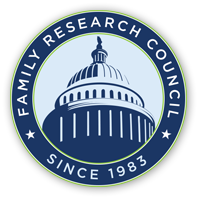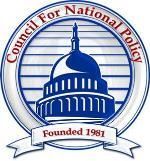
The Federalist Society for Law and Public Policy Studies (FedSoc) is an American conservative and libertarian legal organization that advocates for a textualist and originalist interpretation of the U.S. Constitution. Headquartered in Washington, D.C., it has chapters at more than 200 law schools and features student, lawyer, and faculty divisions; the lawyers division comprises more than 70,000 practicing attorneys in ninety cities. Through speaking events, lectures, and other activities, it provides a forum for legal experts of opposing views to interact with members of the legal profession, the judiciary, and the legal academy. It is one of the most influential legal organizations in the United States.

The Family Research Council (FRC) is an American evangelical activist group and think-tank with an affiliated lobbying organization. FRC promotes what it considers to be family values. It opposes and lobbies against: access to pornography, embryonic stem-cell research, abortion, divorce, and LGBT rights. The FRC has been criticized by media sources and professional organizations such as the American Sociological Association for using "anti-gay pseudoscience" to falsely conflate homosexuality and pedophilia, and falsely to claim that the children of same-sex parents suffer from more mental health problems.

Zell Bryan Miller was an American author and politician from the state of Georgia. A member of the Democratic Party, Miller served as lieutenant governor from 1975 to 1991, 79th governor of Georgia from 1991 to 1999, and as U.S. senator from 2000 to 2005.

The American Whig–Cliosophic Society (Whig-Clio) is a political, literary, and debating society at Princeton University and the oldest debate union in the United States. Its precursors, the American Whig Society and the Cliosophic Society, were founded at Princeton in 1769 and 1765 by James Madison, William Paterson, Oliver Ellsworth, and Aaron Burr.

Speculation abounded over potential nominations to the Supreme Court of the United States by President George W. Bush since before his presidency.

Samuel Anthony Alito Jr. is an American lawyer and jurist who serves as an associate justice of the Supreme Court of the United States. He was nominated by President George W. Bush on October 31, 2005, and has served since January 31, 2006. He is the second Italian American justice to serve on the U.S. Supreme Court—after Antonin Scalia—and the eleventh Catholic.

Miguel Angel Estrada Castañeda is a Honduran-American attorney who became embroiled in controversy following his 2001 nomination by President George W. Bush to the United States Court of Appeals for the District of Columbia Circuit. Senate Democrats, unable to block his nomination in the Senate Judiciary Committee after the Republican Party took control of the U.S. Senate in 2002, used a filibuster for the first time to prevent his nomination from being given a final confirmation vote by the full Senate. They said Estrada was a conservative ideologue with no experience as a judge.

The Council for National Policy (CNP) is an umbrella organization and networking group for conservative and Republican activists in the United States. It was launched in 1981 during the Reagan administration by Tim LaHaye and the Christian right, to "bring more focus and force to conservative advocacy". The membership list for September 2020 was later leaked, showing that members included prominent Republicans and conservatives, wealthy entrepreneurs, and media proprietors, together with anti-abortion and anti-Islamic extremists. Members are instructed not to reveal their membership or even name the group.

Priscilla Richman is an American lawyer and jurist serving as the chief United States circuit judge of the United States Court of Appeals for the Fifth Circuit. She was previously a justice of the Texas Supreme Court.
The Gang of 14 was a bipartisan group of Senators in the 109th United States Congress who successfully, at the time, negotiated a compromise in the spring of 2005 to avoid the deployment of the so-called "nuclear option" by Senate Republican Majority over an organized use of the filibuster by Senate Democrats. The term alludes to the phrase "Gang of Four", used in China to refer to four ex-leaders blamed for the abuses during the rule of Mao Zedong.

Richard Albert Mohler Jr. is an American evangelical theologian, the ninth president of The Southern Baptist Theological Seminary in Louisville, Kentucky, and host of the podcast The Briefing, where he daily analyzes the news and recent events from an evangelical perspective. He has been described as "one of America's most influential evangelicals".

Anthony Richard Perkins is an American politician and evangelical lobbyist. He is president of the Family Research Council, a Christian conservative policy and lobbying organization based in Washington, D.C. Perkins, an ordained Southern Baptist pastor, was previously a police officer and television reporter, served two terms as a Republican member of the Louisiana House of Representatives and unsuccessfully ran for the U.S. Senate in 2002. On May 14, 2018, he was appointed to the United States Commission on International Religious Freedom.

On October 3, 2005, Harriet Miers was nominated for Associate Justice of the U.S. Supreme Court by President George W. Bush to replace retired Associate Justice Sandra Day O'Connor. Miers was, at the time, White House Counsel, and had previously served in several roles both during Bush's tenure as Governor of Texas and President.

On October 31, 2005, President George W. Bush nominated Samuel Alito for Associate Justice of the Supreme Court of the United States to replace retiring Justice Sandra Day O'Connor. Alito's nomination was confirmed by a 58–42 vote of the United States Senate on January 31, 2006.
The Arlington Group was a coalition uniting the leaders of prominent Christian conservative organizations in the United States. Founded in 2002 principally through the efforts of American Family Association President Donald Wildmon and Free Congress Foundation Chairman Paul Weyrich, the group sought to establish consensus goals and strategy among its members and translate its combined constituency into an overwhelming force within the Republican Party, particularly at its highest levels. Its membership and purpose overlapped to a high degree with the Council for National Policy; but the group is much more narrowly focused, choosing to emphasize such issues as same-sex marriage, abortion, and confirmation of like-minded federal judges.

The Roberts Court is the time since 2005 during which the Supreme Court of the United States has been led by John Roberts as Chief Justice. It is generally considered to be more conservative than the preceding Rehnquist Court and the most conservative court since the Vinson Court of the 1940s and early 1950s. This is due to the retirement of relatively moderate conservative Justices Sandra Day O'Connor and Anthony Kennedy, the death of liberal Justice Ruth Bader Ginsburg, and the confirmation of conservative Justices Samuel Alito, Brett Kavanaugh, and Amy Coney Barrett in their places, respectively. Since Barrett's confirmation, the Court has six conservative justices and three liberal justices.
Highview Baptist Church is a Baptist multi-site megachurch based in Louisville, Kentucky. It is affiliated with the Kentucky Baptist Convention and Southern Baptist Convention. Aaron Harvie is currently the church's senior pastor.
The 2005 debate on the nuclear option was a political debate in the United States Senate regarding the possible use of the nuclear option to allow a simple majority to confirm judicial nominees. At the time, three-fifths of all senators duly chosen and sworn were required to end debate on nominations under Rule XXII of the Senate's standing rules.
Manuel A. Miranda is a Cuban-born American attorney, diplomat, journalist, and political advocate. He served as a diplomat at the Embassy of the United States, Baghdad as the first Director of the Office of Legislative Statecraft. Miranda also led U.S. Senate efforts to seat the judicial nominees of President George W. Bush as Republican Senior Nominations Counsel on the United States Senate Committee on the Judiciary and Judicial Affairs Counsel to then-Senate Majority Leader Bill Frist.